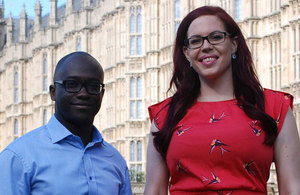First ever mental health champion for schools unveiled
Leading campaigner Natasha Devon becomes first ever Department for Education mental health champion.

Sam Gyimah and Natasha Devon
The Department for Education’s (DfE) first ever mental health champion for schools will help to raise awareness and reduce the stigma around young people’s mental health.
Natasha Devon MBE - who works as a television pundit and writer - was chosen for the role following her extensive work with young people. This includes launching 2 organisations which give young people practical tips on dealing with mental health and body image concerns. As founder of the Self-Esteem Team and the Body Gossip education programme, Natasha has delivered classes to more than 50,000 teenagers, as well as their parents and teachers.
The move comes as part of a wider government commitment to improve children and young people’s mental health - including the way these services work with schools - with £1.25 billion to be invested specifically in young people’s mental health over the next 5 years. This money will transform local services so that every organisation involved with caring for children and young people works together to support them with their mental health, not just the National Health Service (NHS).
Alongside this, the Department of Health, working with NHS England, is investing £150 million over this Parliament to improve eating disorder services, backed up by a new standard so that young people who need help can be seen within 4 weeks or 1 week for urgent cases by 2020. The very worst emergency cases should find support within 24 hours. The funding will be used to improve community-based services so patients are helped earlier and fewer need in-patient care.
Having suffered from an eating disorder herself, Natasha Devon will use her personal experiences to champion young people’s mental health as widely as possible, and encourage more children to talk about the issues they are dealing with.
Education and Childcare Minister Sam Gyimah said:
Ensuring young people have access to good mental health support is vital. That is why we are promoting greater use of counselling in schools, improving teaching about mental health, and supporting joint working between mental health services and schools.
But we know there is more we can do. Natasha is an inspiration to many young people and I’m delighted to have her on board as our first mental health champion.
I know that together we can make a real difference in encouraging more young people to talk openly about mental health.
Writer and campaigner Natasha Devon said:
I’m so excited by this opportunity to improve the lives of even more young people. At present, 3 children per average classroom has a diagnosable mental health problem, with many more struggling with undiagnosed conditions such as anxiety.
This has a tangible impact not only on their happiness, but also on their potential. It’s therefore vital that we can improve the support available for children and teens.
This is a cause that’s very close to my heart, and I know from personal experience, as well as from the young people I have met, how crucial this work is. I’m looking forward to getting started and making a difference.
Health Minister Alistair Burt, who is responsible for mental health, said:
Mental health is a priority for this government and I’m proud that we are investing £1.25 billion in services for children and young people over the next 5 years, as well as introducing treatment targets for the first time so they get the help they need when they need it.
I’m delighted to support Minister Gyimah and the Department for Education in this fantastic initiative, which will help tackle stigma and help improve the mental health of every child and young person in this country.
Over the coming weeks and months, Natasha will work closely with the Education and Childcare Minister to help de-stigmatise young people’s mental health.
This comes as DfE has contributed £1.5 million to a joint pilot with NHS England to improve joint working between mental health services and schools. DfE is also providing nearly £5 million of additional funding for charities supporting mental health.
Notes to editors
- Sam Gyimah is the first minister in DfE to have specific responsibility for mental health in his portfolio and he is working closely with Alistair Burt. Officials from DfE and Department of Health are working together on a programme of work.
- To improve teaching about mental health we funded the PSHE Association guidance ‘Preparing to teach about mental health and emotional well-being’, which was published in March 2015. A set of lesson plans spanning key stages 1 to 4 is also available for schools.
- In March we published ‘Counselling in schools: a blueprint for the future’ which provides schools with practical, evidence-based advice informed by schools and counselling experts on how to deliver high-quality, school-based counselling.
- Last year we also published ‘Mental health and behaviour in schools’, which gives advice to help schools support young people with mental health needs, including making referrals to a specialist service if necessary.
- All clinical commissioning groups (CCGs) have been asked to work with their partners to develop plans to transform their local offer (local transformation plans) to improve children and young people’s mental health and well-being. These local transformation plans, alongside existing investment, should include the full spectrum of interventions: from prevention and resilience building, to support and care for existing and emerging mental health problems, as well as transitions between services and addressing the needs of the most vulnerable, such as those with learning disabilities. Guidance for CCG local transformation plans were published in early August and CCGs have been told how much they will receive, dependent on their submissions of robust plans. These plans will be assured in October and funding released shortly after.
DfE media enquiries
Central newsdesk - for journalists 020 7783 8300